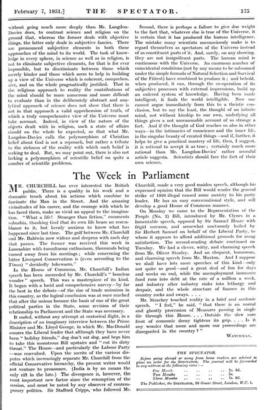The Week in Parliament
MR. CHURCHILL has ever interested the British public. There is a quality in his work and a dramatic touch about his actions which combine to fascinate the Man in the Street. And the amazing vicissitudes of his career, and the courage with which he has faced them, make so vivid an appeal to the imagina- tion. "What a life! Stranger than fiction," comments suburbia, thanking God that its own life bears no resem- blance to it, but keenly anxious to know what has happened since last time. The gulf between Mr. Churchill and Mr. Baldwin now .widens and deepens with each day that passes. The former was received this week in Lancashire with tumultuous enthusiasm, thousands being turned away from his meetings ; while concerning the latter Liverpool Conservatism is (even according to the Times) " decidedly lukewarm."
In the House of Commons, Mr. Churchill's Indian speech has been succeeded by Mr. Churchill's " boneless wonder " speech. This was a masterpiece of its kind. It began with a lucid and comprehensive survey—by far the best in the debate—of the rise of trade unionism in this country, so the logical conclusion was at once reached that after the unions became the basis of one of the great political parties in the State, some revision of their relationship to Parliament and the State was necessary.
It ended, without any attempt at oratorical flight, in a description of an imaginary interview between the Prime Minister and Mr. Lloyd George, in which Mr. MacDonald assures the Liberal leader that although they have never been " holiday friends," dog don't eat dog, and begs him to take this monstrous Bill upstairs and " cut its dirty throat." The House—and particularly the Labour Party —was convulsed. Upon the merits of the various dis- putes which increasingly separate Mr. Churchill from the official Conservative hierarchy, the present writer would not venture to pronounce. (India is by no means the only rift in the kite.) ' The divergence is, however,, the most important new factor since the resumption of the session, and must be noted by any observer of contem- porary politics. Sir Stafford Cripps,- who followed Mr. Churchill, made a very good maiden speech, although his expressed opinion that the Bill would render the general strike of 1926 illegal caused some anxiety to his party leader. He has an easy conversational style, and will develop a good House of Commons manner.
On Monday we came to the Representation of the People (No. 2) Bill, introduced by Mr. Clyncs in a lamentable speech, opposed by Sir Samuel Hoare with frigid sarcasm, and somewhat unctuously hailed by Sir Herbeit Samuel on behalf of the Liberal Party, to whom it appears to afford additional grounds for smug satisfaction. The second-reading debate continued on Tuesday. We had a clever, witty, and charming speech from Mr. Oliver Stanley. And an eloquent, humorous, and charming speech from Mr. Maxton. And I suppose we shall have lots more speeches of this kind—only not quite so good—and a great deal of fun for days and weeks on end, while the unemployment insurance fund runs into debt at the rate of a million a week, and industry after industry sinks into lethargy and despair, and the whole structure of finance in this • country rocks and sways. . . .
Mr. Strachey touched reality in a brief and sardonic speech. " I feel," he said, " that there is an unreal and ghostly procession of Measures passing in single file through this House. . . . Outside the slow sure frost of economic decay tightens its grip. . . . Is it any wonder that more and more our proceedings are disregarded in the country ? "
WATCHMAN.










































 Previous page
Previous page